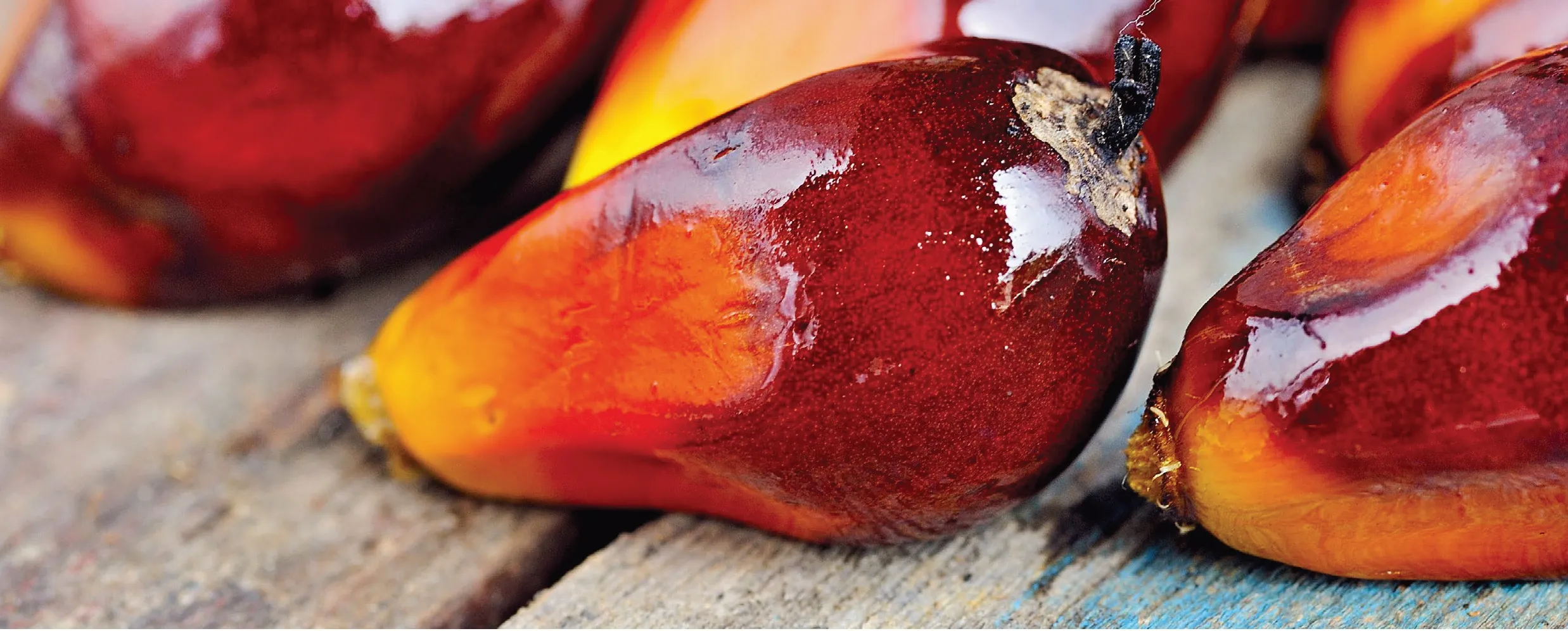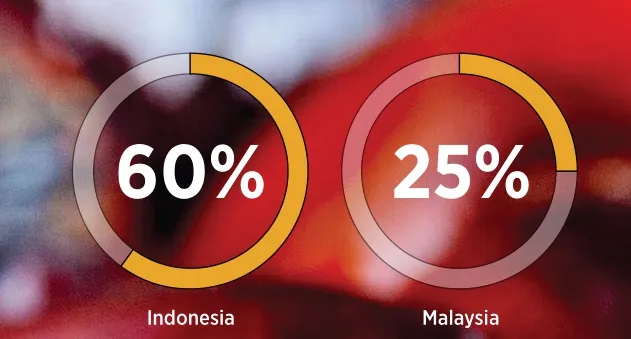Indonesia’s Palm Oil Dilemma
2022-07-20ByGuoXixian
By Guo Xixian
The volatility of Indonesia’s palm oil export policy is shaped by the tense international situation and the persistently high domestic oil price

Oil palm fruits.(GETTY CREATIVE)
On May 19,the Indonesian government announced it was lifting the ban on palm oil exports issued 25 days before.The frequent changes in its palm oil export policy were caused by dual pressure from the international and domestic markets,which in turn exerted a huge impact on domestic and global vegetable oil markets.
Palm oil,soybean oil,and canola oil are known as“the world’s three major vegetable oils.”Oil palms can be harvested after two years of cultivation,and they can continue to produce oil for more than 20 years.As a country of thousands of islands,only 33 percent of the Indonesian territory is agricultural land.Oil palms,with a high yield of oil on limited soil,have thus been favored by Indonesians.Today,Southeast Asia is the world’s major palm oil producing region.Indonesia’s palm oil output accounts for about 60 percent of global production while Malaysia’s output accounts for about 25 percent.
Frequent Policy Changes
The COVID-19 pandemic disrupted the export logistics for vegetable oils.Supply shortages in turn led to higher prices worldwide.The price of cooking oil in Indonesia eclipsed the benchmark of 14,000 rupiahs/liter in September 2021 and continued to climb to 18,000 rupiahs/liter by February 2022.It became difficult to find affordable cooking oil in supermarkets and traditional market vendors alike.To solve the problem,the Indonesian government issued successive regulations.In January of this year,the Indonesian government released oil price subsidies of 360 million rupiahs,a maximum retail price of 14,000 rupiahs/liter for six months,and an export licensing system.On January 27,the Indonesian government launched a domestic market responsibility(DMO) mechanism which forced producers to sell 20 percent of their products in the domestic market.On March 9,the DMO share was raised to 30 percent,which was revoked abruptly on March 27.Instead,the export tariff rate was raised sharply from US$375/ton to US$675/ton.The purpose of the Indonesian government’s policies was to increase domestic supply and lower the price of cooking oil.However,in the face of the huge impact of the Russia-Ukraine conflict on the international market,the policies haven’t seemed to work.

Today,Southeast Asia is the world’s major palm oil producing region.Indonesia’s palm oil output accounts for about 60 percent of global production while Malaysia’s output accounts for about 25 percent.
On February 24,the conflict between Russia and Ukraine broke out,casting a shadow on the energy and commodity markets.The top three global sunflower oil exporters in 2021 were Ukraine,Russia,and Argentina.When two of them pressed the pause button simultaneously,the market was forced to seek alternatives.The price of all cooking oils,including soybean oil,palm oil,and coconut oil,rose rapidly after February 2022.To ensure domestic food supply,traditional food exporters introduced protective measures one after another,and food protectionism spread around the world.The World Bank said in its latestCommodity Market Outlookreport released on April 26 that the war in Ukraine dealt a major shock to commodities markets.The rise in energy prices over the past two years has been the largest since the 1973 oil crisis.Agricultural and metal prices are expected to rise by nearly 20 percent in 2022,and global prices will remain at historically high levels through the end of 2024.
The rise in international oil prices has led to high domestic cooking oil prices in Indonesia,and the repeatedly adjusted export policies did not achieve the expected results.On March 19,the BBC Indonesian channel reported that the Indonesian cooking oil price had risen to as high as 25,000 rupiahs/liter,70 percent higher than the price of 14,000 rupiahs/liter in September 2021.Many poor families could no longer afford the high price of cooking oil.Nevertheless,because the international palm oil price was generally higher than that in the domestic market,Indonesian companies and traders still preferred to sell their palm oil abroad rather than in the domestic market,which resulted in short supply in Indonesia.In response,Indonesian President Joko Widodo announced that exports of all cooking oils and relevant raw materials would be banned starting April 28 after a cabinet meeting on the evening of April 22.
Supply-Demand Imbalance
Palm oil is the most widely used vegetable oil worldwide and plays apivotal role not only in the food industry,but also in production of cosmetics,detergent,and other products.As the largest palm oil exporter,Indonesia cannot be replaced by any other country in the short run.After the announcement of its export ban,almost all procurement demand in the international market shifted to Malaysia.However,Malaysia’s current palm oil stocks were far from enough to cover all the supply shortages caused by the Indonesian policy.The shortterm shortage of palm oil led major importers of vegetable oils such as India and Europe to shift some of their demand to varieties such as soy and canola oil.Due to the limited supply of old stocks and the slow growth of new crops,the contradiction between supply and demand could not be alleviated.

Workers load harvested palm fruits onto a truck at an oil palm plantation in Bogor,Indonesia,on April 26,2022.(XINHUA)
When the export ban was implemented,Indonesia’s rising palm oil stocks exerted pressure on its storage capacity.According to the Indonesia Palm Oil Association,since the DMO policy was issued in March,the country’s palm oil stocks have exceeded 5 million tons,approaching its maximum storage capacity of 6 to 7 million tons.Secretary-general of the association Eddy Martono said earlier that within a month of the ban,all cooking oil storage tanks in the country would be full.Once the storage space runs out,refineries will be forced to stop processing more palm fruits,leaving them to the mercy of nature.Indonesia placed an“emergency brake”on palm oil exports in an attempt to improve the livelihood of its own people,said Zhou Shixin,associate researcher at the Asia-Pacific Research Center of the Shanghai Institute for International Studies,but it is having a hard time digesting the raw materials with its current industrial capacity,which has in turn damaged the people’s livelihood and its macro economy.
The export ban has failed to effectively curb the high domestic price of palm oil.Statistics from the Ministry of Trade of Indonesia showed that by May 13,the average price of Indonesia’s bulk cooking oil was 17,300 rupiahs/liter.Despite falling from the peak,the price was still far from the Indonesian government’s target of 14,000 rupiahs/liter.
As profit margins shrank due to the too-low price ceiling for refined palm oil imposed by the government,many refineries chose to stop production,leaving the fruits to rot at the source.The Indonesian Palm Farmers’Association said in a statement that the price of palm fruits had fallen 70 percent from the lowest price set by local governments since the Indonesian government announced the export ban.Small-scale farmers have suffered greatly.
Meanwhile,because the Indonesian government did not impose restrictions on the price of packaged cooking oil,some manufacturers chose to process and sell high-end packaged cooking oil to meet the government’s requirement for domestic supply.As a result,high priced oil still enjoyed sufficient supply in the market,while low priced bulk oil was hard to acquire.
Public discontent continued accumulating.On May 17,protests broke out in several Indonesian provinces and cities demanding the government lift the ban on palm oil exports.Bhima Yudhistira,director of Indonesia’s Centre for Economic and Legal Studies,affirmed in an interview withNikkei Asiathat the export ban did not curb cooking oil prices in Indonesia’s domestic retail market.Those who benefited from the ban were farmers and palm oil companies in Malaysia,but Indonesia’s trade balance in May would pay the price.
The international market continued to be short of palm oil.Under the multiple pressures of the sustained high price of palm oil in the domestic market,high stock,and accumulated public discontent,Indonesian President Joko Widodo said in a video message that although the price of bulk cooking oil had not yet fallen to the target,considering the well-being of the 17 million workers in the palm oil industry,Indonesia would lift the ban.
Although the ban was lifted,exports have not yet fully resumed.On May 20,Indonesian Coordinating Minister for the Economy Airlangga Hartarto said that after exports of Indonesian palm oil resume,the government will reinstate the DMO policy of 20 percent to ensure domestic stock of 10 million tons.The Indonesian Central Bureau of Logistics was assigned the responsibility of establishing cooking oil buffer reserves.On May 27,senior Ministry of Trade official Veri Anggriono said that Indonesia would allocate about 1 million tons of palm oil for exports and grant export license priority to companies registered to participate in the government’s bulk cooking oil project.According to the information released by the Ministry of Trade on June 9,Indonesia is launching an export acceleration program that will extend until July 31.Indonesia is actively working to ease the pressure on its stock by accelerating exports.
Against the backdrop of a severe global shortage of cooking oil,the Indonesian government attempted to restrict exports of palm oil to increase domestic supply and thus lower the persistently high price of the oil.However,the short-term imbalance between supply and demand in the international market could not be so quickly changed,so the Indonesian government had to respond by adjusting its export policy.
杂志排行
China Report Asean的其它文章
- Pause…And Play
- Labor Shortages In Manufacturing
- Mutual Prosperity China and its Southeast Asian neighbors need to enhance industrial cooperation
- Indo-Pacific Economic Framework:A New Landscape?
- INDIA-CHINA TIES SHOULDN’T BE HELD HOSTAGE TO QUAD
- SHANGRI-LA DIALOGUE:ASEAN’S REAFFIRMED OUTLOOK ON THE ASIA-PACIFIC
